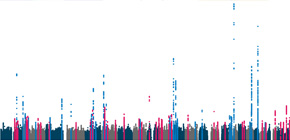
Obesity-related gene markers identified
Obesity-related diseases and cells identified through analyses of 170,000 Japanese subjects
Obesity, a risk factor for developing various diseases, is caused by eating too much, a lack of exercise, and genetic factors. However, a biological mechanism of how hereditary factors lead to individual differences in weight has not been fully clarified.
A joint group of researchers from the RIKEN Center for Integrative Medical Sciences and the Graduate School of Medicine, Osaka University, together with the Tohoku Medical Megabank Organization, Tohoku University; Iwate Tohoku Medical Megabank Organization, Iwate University, and the National Cancer Center, Center for Public Health Sciences, performed a large-scale genome-wide association study (GWAS) of body mass index (BMI) using about 160,000 Japanese people’s genetic information, verification of reproducibility of about 15,000 Japanese people, and trans-ethnic meta-analyses using public available results of about 320,000 Europeans. As a result, this group identified 193 variants (susceptibility loci for body weight regulation) on human genome relevant to body weight regulation. Of them, 112 loci were newly identified.
Through integrated analyses of tissue-specific epigenetics and GWAS, this group found genetic evidence to show that in addition to previously reported brain cells, lymphocytes, or immune cells, played a major role in regulating weight.
Furthermore, this group evaluated genetic correlations between 33 diseases and body weight by using GWAS results, and found that naturally skinny people had a high risk of developing rheumatoid arthritis (RA), adolescent idiopathic scoliosis (AIS), and schizophrenia and that naturally fat people had a high risk of developing type 2 diabetes (T2D), cardiovascular diseases (brain infarction, cardiac infarction, arteriosclerosis obliterans), and bronchial asthma and ossification of posterior longitudinal ligament (OPLL).
This group’s achievements will be helpful in preventing the onset of diseases in the future. They provide new knowledge about hereditary factors that influence individual differences in body weight from genetic knowledge and a wide range of viewpoints, such as weight-disease correlation and biologically related tissues and cell types. This will help the development of research in a wide weight-related scientific field.
Abstract
Obesity is a risk factor for a wide variety of health problems. In a genome-wide association study (GWAS) of body mass index (BMI) in Japanese people (n = 173,430), we found 85 loci significantly associated with obesity (P < 5.0 × 10 −8 ), of which 51 were previously unknown. We conducted trans-ancestral meta-analyses by integrating these results with the results from a GWAS of Europeans and identified 61 additional new loci. In total, this study identifies 112 novel loci, doubling the number of previously known BMI-associated loci. By annotating associated variants with cell-type-specific regulatory marks, we found enrichment of variants in CD19 + cells. We also found significant genetic correlations between BMI and lymphocyte count (P = 6.46 × 10 −5 , r g = 0.18) and between BMI and multiple complex diseases. These findings provide genetic evidence that lymphocytes are relevant to body weight regulation and offer insights into the pathogenesis of obesity.

Figure 1

Figure 2

Figure 3

Figure 4
To learn more about this research, please view the full research report entitled " Genome-wide association study identifies 112 loci for body mass index in the Japanese population " at this page of the Nature genetics website.
Related link
